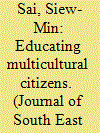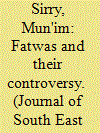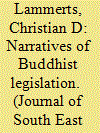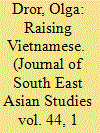|
|
|
Sort Order |
|
|
|
Items / Page
|
|
|
|
|
|
|
| Srl | Item |
| 1 |
ID:
124272


|
|
|
|
|
| Publication |
2013.
|
| Summary/Abstract |
This article recounts the unusual history of a national idea in late colonial Singapore from the 1930s to the early 1950s before Singapore's attainment of partial self-government in 1955. Using two different concepts, namely 'colonial nationalism' and 'imperial citizenship', it offers a genealogy of nationalism in Singapore, one that calls into question the applicability of prevailing theories of anti-colonial nationalism to the Singapore-in-Malaya context. Focusing on colonial nationalism, the article provides a historical account of English-mediated official multiculturalism through tracking shifting British colonial priorities, ideologies of governance and challenges to its authority in Singapore. This account is rarely appreciated in Singapore today given official scripting of national history that abets particular amnesias with regards to its multicultural nationhood.
|
|
|
|
|
|
|
|
|
|
|
|
|
|
|
|
| 2 |
ID:
124274


|
|
|
|
|
| Publication |
2013.
|
| Summary/Abstract |
This article discusses a different side of two controversial fatwas - one against Muslims participating in Christmas celebrations and the other against pluralism, liberalism and secularism - issued by the Majelis Ulama Indonesia (MUI, Council of Indonesian Ulama). Most studies on MUI have emphasised the role that the Council's fatwas have played in inciting sectarian violence in Indonesia. Without denying the connections between violence and the MUI fatwas, this article argues that these controversial fatwas have also opened up room for more fruitful and constructive discussions among different religious groups in Indonesia. This article asks: What were the roots of the controversy over these intolerant fatwas? How did the state respond to them? And what does the controversy over these fatwas tell us about the nature of public debate on Islam in Indonesia? By answering these questions this article will shed light on aspects of contemporary Indonesian public debates about Islam that have been overlooked in current scholarship
|
|
|
|
|
|
|
|
|
|
|
|
|
|
|
|
| 3 |
ID:
124275


|
|
|
|
|
| Publication |
2013.
|
| Summary/Abstract |
For more than a century scholars of central and western mainland Southeast Asia have sought to characterise the status of dhammasattha - the predominant genre of written law from the region before colonialism - and define its authority vis-à-vis Pali Buddhism. For some, dhammasattha texts represent a predominantly 'secular' or 'customary' tradition, while for others they are seen as largely commensurate with, if not directly derived from, the religio-political ideas of a cosmopolitan and purportedly canonical 'Therav?da'. However, scholarship has yet to investigate the way that regional authors during the late premodern period themselves understood the character and legitimacy of written law. The present article examines seventeenth through nineteenth-century Burmese narratives concerning the genealogy and status of dhammasattha to advance a pluralist conception of the relationship between law and religion in Southeast Asian history. This analysis addresses a historical context where ideas concerning Buddhist textual authority were in the process of development, and where there were multiple and competing discourses of legal ideology in play. For elite monastic critics closely connected with royalty, dhammasattha stood in problematic relation to authoritative taxonomies of scripture, and its jurisprudence was seen to contradict authorised accounts of the origin and nature of Buddhist law; the genre thus required reform to be brought into alignment with what were construed as orthodox legal imaginaries. The principal hermeneutic move these monastic commentators performed to achieve this involved redescribing dhammasattha in light of such accounts as a variety of Buddhist royal legislation and written law as the prerogative of the Buddhist state.
|
|
|
|
|
|
|
|
|
|
|
|
|
|
|
|
| 4 |
ID:
124276


|
|
|
|
|
| Publication |
2013.
|
| Summary/Abstract |
Historians may have come late to the study of women and gender in Southeast Asia, but when these three books are placed along a historiographical spectrum one can only be impressed at how far the field has moved in approach and methodology. Exploiting previously untapped sources that emanate from very different sites - a Dutch East India Company courtroom, the women's quarters of a Malay palace, the privacy of a Javanese home - the authors open up new avenues by which to explore the complexity of Southeast Asia's gender history. Though the contexts are very different, the movement through time (Wives, slaves and concubines is set in the late eighteenth century, Victorious wives in the nineteenth, and Realizing the dream in the twentieth) provides an opportunity to gauge shifts in representations of 'femaleness', attitudes towards gender roles, and women's responses to change.
|
|
|
|
|
|
|
|
|
|
|
|
|
|
|
|
| 5 |
ID:
124273


|
|
|
|
|
| Publication |
2013.
|
| Summary/Abstract |
This essay considers the importance of looking at writings for children for historical analysis, particularly in times of war, focusing on magazines published for youth in South Vietnam in the early 1970s. Two magazines, Thi?u Nhi and Th?ng B?m, in particular, are studied in terms of their editorial aims and contents, as well as their young readers' submissions in response to contemporary sociocultural issues raised in these magazines. The lively discussions in these magazines were made possible by the relative freedom of expression in South Vietnam, compared to North Vietnam, which was an important reason for the civil war being fought. Yet this freedom also challenged the fabric of Vietnamese society. The strongest concern of these magazines' initiators, editors and writers was that its readers not lose their sense of being Vietnamese in the face of the great wartime flood of American popular culture that captivated many youth. Anxiety that the younger generation would be Americanised and lose their identity struck at the core of what the war was being fought about: i.e. different versions of being Vietnamese in the modern world. This threat of Americanisation to fundamental Vietnamese values was perceived by some intellectuals in the South as more serious than the threat of communism, because at least the communists were Vietnamese.
|
|
|
|
|
|
|
|
|
|
|
|
|
|
|
|
|
|
|
|
|